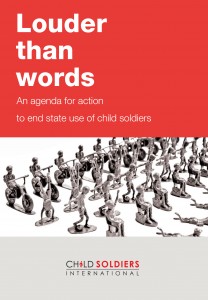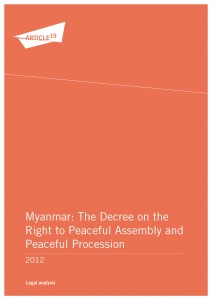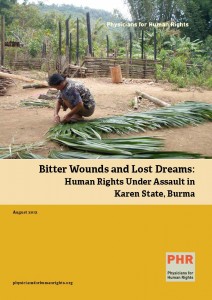Spotlight (188 found)
Arbitrary Arrests in Burma: A Tool to Repress Critical Voices
The Assistance Association for Political Prisoners (Burma) is highly concerned that the government of Burma continues to use arbitrary arrest as a tool to hold members of the democracy and human rights movement behind bars often without formal charges […]
• • •Louder Than Words: An Agenda for Action to End State Use of Child Soldiers
 The report “Louder than words: An agenda for action to end state use of child soldiers” is published to mark the tenth anniversary year of the entry into force of the Optional Protocol to the Convention on the Rights of the Child on the involvement of children in armed conflict. It examines the record of states in protecting children from use in hostilities by their own forces and by state-allied armed groups. It finds that, while governments’ commitment to ending child soldier use is high, the gap between commitment and practice remains wide. Research for the report shows that child soldiers have been used in armed conflicts by 20 states since 2010, and that children are at risk of military use in many more […]
The report “Louder than words: An agenda for action to end state use of child soldiers” is published to mark the tenth anniversary year of the entry into force of the Optional Protocol to the Convention on the Rights of the Child on the involvement of children in armed conflict. It examines the record of states in protecting children from use in hostilities by their own forces and by state-allied armed groups. It finds that, while governments’ commitment to ending child soldier use is high, the gap between commitment and practice remains wide. Research for the report shows that child soldiers have been used in armed conflicts by 20 states since 2010, and that children are at risk of military use in many more […]
Freedom on the Net 2012
While the military junta that ruled Burma for decades was interested in expanding information and communication technologies (ICTs) for business and propaganda purposes, it also made aggressive attempts to restrict access to digital media and control online content. Elections in November 2010 changed this dynamic […]
• • •Burma’s Parliament: Fundamental Reforms Still Blocked
From 4 July to 7 September, Burma’s Parliament held its fourth session. Despite efforts by some opposition MPs, regime officials and USDP MPs continued to block fundamental legislative reforms, including the repeal of existing oppressive laws and the adoption of progressive legislation. In addition, the regime failed to introduce the much-heralded media law […]
• • •The Decree on the Right to Peaceful Assembly and Peaceful Procession
 The Decree on the Right to Peaceful Assembly and Peaceful Procession is one of the first laws governing civil and political rights to be adopted since the election of a quasi-civilian government in November 2010. ARTICLE 19’s analysis of the law finds the law to be inconsistent with the right to freedom of expression and the right to assembly.
The Decree on the Right to Peaceful Assembly and Peaceful Procession is one of the first laws governing civil and political rights to be adopted since the election of a quasi-civilian government in November 2010. ARTICLE 19’s analysis of the law finds the law to be inconsistent with the right to freedom of expression and the right to assembly.
In the analysis, ARTICLE 19 appreciates the Decree’s recognition of the state’s duty to protect assembly participants. However, the requirement for permission to hold an assembly, the grounds for denying permission, the lack of a court appeal and the absence of guarantees for media access to assemblies are problematic and must be urgently revised […]
Briefing Regarding Myanmar Peace Team’s Meetings with Mae Tao Clinic Team
This briefing paper provides details about the recent meetings with the Myanmar Government Peace Team led by Minister U Aung Min. The paper clarifies Mae Tao Clinic’s position on continuing to provide crucial health services on the Thai-Burma border and identifies three key areas that the government must prioritize in order to begin addressing Burma’s current underfunded and highly centralized health system […]
• • •Ad Hoc and Inadequate
Thailand’s Treatment of Refugees and Asylum Seekers
Karen Community Based Organizations’ Position on Refugees’ Return to Burma
This is a preliminary working paper prepared by the Karen Community Based Organizations (KCBOs) concerned with refugees’ repatriation and return to Burma […]
• • •‘Threats to Our Existence’: Persecution of Ethnic Chin Christians in Burma
This new report “‘Threats to Our Existence’: Persecution of Ethnic Chin Christians in Burma” by the Chin Human Rights Organization (CHRO) exposes a decades-long pattern of religious freedom violations that persist today under the new government, and documents other serious human rights abuses such as forced labour, torture, and other cruel and inhuman treatment, forcing thousands of Chin to flee their homeland […]
• • •Bitter Wounds and Lost Dreams: Human Rights Under Assault in Karen State, Burma
 Even as Burma’s central government institutes political reforms, the Burmese army continues to routinely violate the human rights of ethnic minorities in Karen State, PHR reports, citing findings from a field survey conducted in early 2012.
Even as Burma’s central government institutes political reforms, the Burmese army continues to routinely violate the human rights of ethnic minorities in Karen State, PHR reports, citing findings from a field survey conducted in early 2012.
PHR’s report – Bitter Wounds and Lost Dreams: Human Rights Under Assault in Karen State, Burma – provides a snapshot of ongoing abuses against Karen people and communities in the country’s mountainous eastern region bordering Thailand, where the army has been battling insurgent groups for decades […]









 All posts
All posts